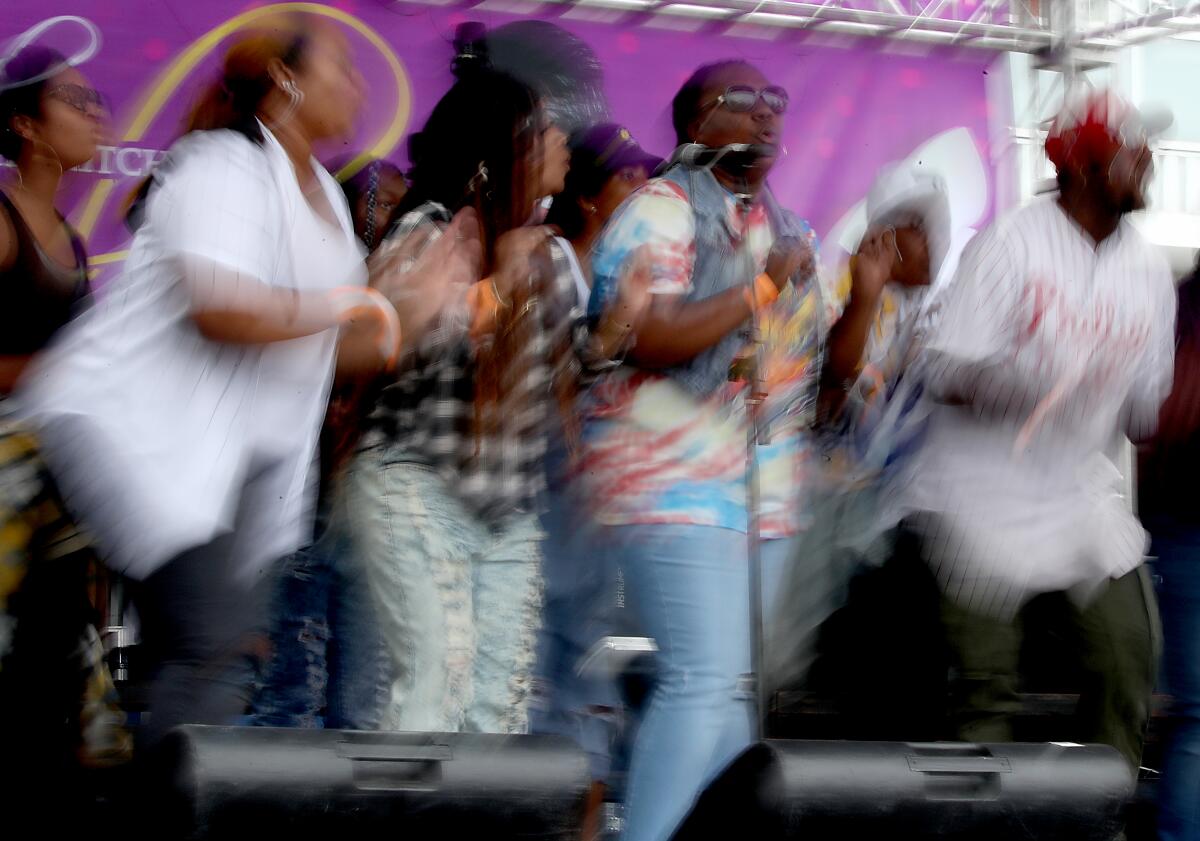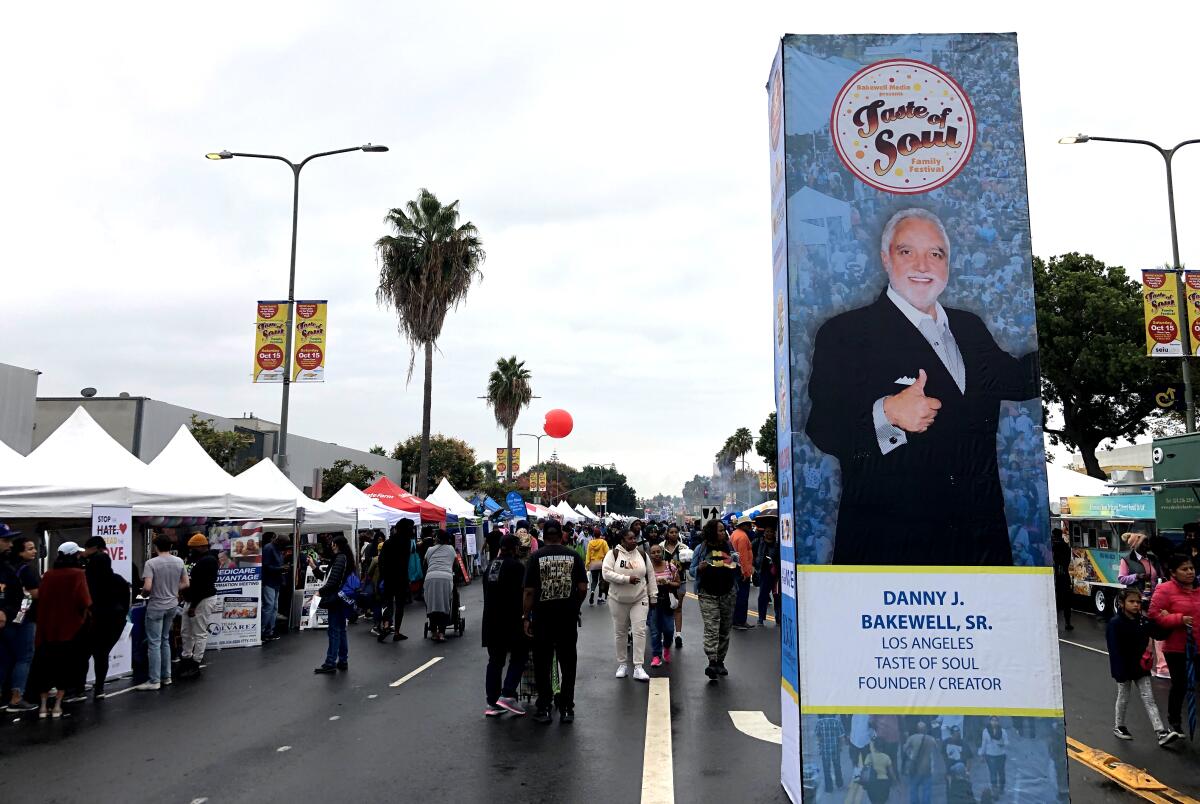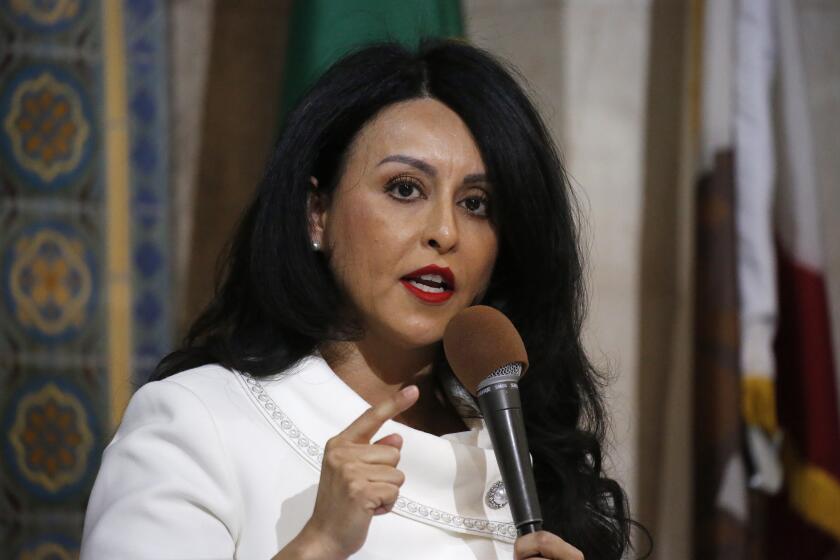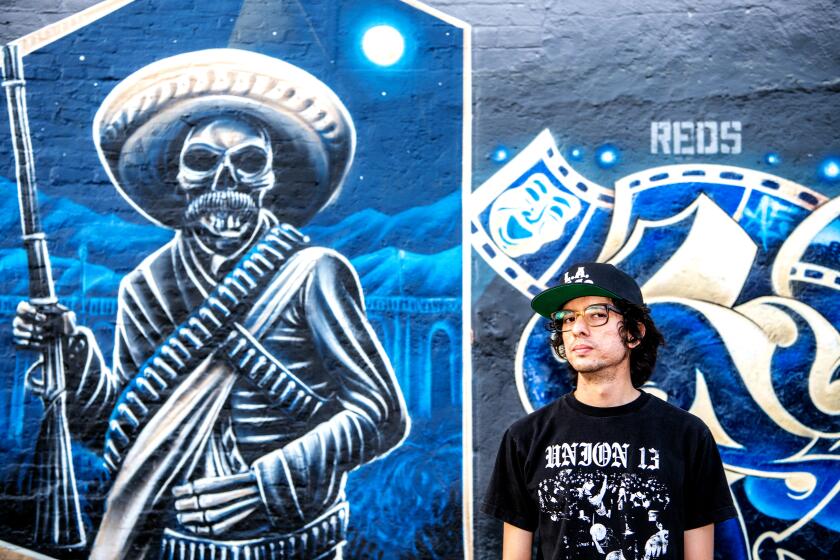Who is Danny Bakewell, the Black L.A. power broker named in the Nury Martinez audio?

On a cloudy Saturday afternoon in Crenshaw, Danny Bakewell Sr.âs name is almost inescapable.
âEverything he touches has made an impact in our community,â said Jay Conedy, 60, from beneath a towering poster of Bakewell Sr. giving a thumbs-up.
âHeâs synonymous with the area,â added Yolanda Duvernay, 71, as she wandered Crenshaw Boulevard.
Indeed, nods to Bakewell, 76, filled Taste of Soul, the businessmanâs beloved Black cultural festival, this weekend. Amid R&B performances and Cajun food trucks, his name was everywhere from the video screens lining the eventâs main thoroughfare to the Bakewell Media Music Stage demarcating its southernmost end.
The celebration was a substantially less controversial venue than the last major place Bakewellâs name showed up: on the lips of now-former City Council President Nury Martinez, who â accompanied by three other Latino leaders â was recently caught on tape making racist and derisive comments about her colleagues and others.
The whirlwind scandal thatâs enveloped city politics in the days since audio leaked of an October 2021 meeting between Martinez, fellow councilmembers Gil Cedillo and Kevin de LeĂłn, and now-former L.A. County Federation of Labor President Ron Herrera has infuriated voters and sunk political careers.
Yet relatively unexamined in the maelstrom has been Martinezâs brief references to Bakewell, a high-profile leader among Black Angelenos, real estate developer and the executive publisher and owner of the Los Angeles Sentinel, the long-running Black newspaper.
Audio of Councilmembers Nury Martinez, Kevin de LeĂłn and Gil Cedillo speaking with labor leader Ron Herrera quickly became a new and incendiary issue in the Nov. 8 election.
In the leaked tape, Martinez claims she spoke with Bakewell about a redistricting dispute between two other councilmembers â Curren Price and Marqueece Harris-Dawson, both Black and representing parts of South L.A. â over who should represent USC and Exposition Park.

If Harris-Dawson wanted a high-profile asset for his district, Martinez said she advised Bakewell, the councilmember should try to take Los Angeles International Airport.
âI told Danny, if you want to cut a deal ⌠I would go after the airport,â Martinez can be heard saying in the leaked tape. âHe goes, âFâ, I love that idea.ââ
Bakewell confirmed to The Times that he did talk to Martinez over the phone, but added that a year out from their talk, he didnât remember all the details.
âWhile there seems to be a lot of discussion about who should get USC, I think I said â if I can recall â âleave USC in Currenâs district and give Marqueece the airport,ââ he said. âThatâs a great asset; nobody would turn down that asset. And that alleviates a fight in the Black community and allows us to move on gaining assets, as opposed to fighting over one asset.â
Bakewell added: âThat was the sum total of my comment to her.â
For those less familiar with Bakewellâs influence, the parts of the tape which reference him may seem like incongruous tangents â and are certainly less inflammatory than other moments, including those wherein Martinez describes her colleague Mike Boninâs son as monkey-like or seems to mock Oaxacans.
Why, after all, would the founder of a food festival and publisher of a local paper get looped in on top-level discussions about how the cityâs political power is arranged?
For those who know Bakewell and the power he wields, itâs no mystery at all.
âDanny is a respected person, not only by the community but by the political infrastructure that exists in California,â said Robert Sausedo, the president and CEO of Community Build, a nonprofit focused on economic development in South L.A.
âAfrican Americans havenât always had a seat at the table; weâve more so been on the menu,â Sausedo added. âDannyâs good fight has been about making sure that people have a place at the table.â
Bakewell enjoys behind-the-scenes influence among city leaders. He maintains âa wealth of relationshipsâ through the Sentinel and his other business endeavors, including the Taste of Soul festival, said Najee Ali, a longtime city activist.
âEveryone knows Danny Bakewell in Black Los Angeles,â Ali said. âThe older generation, we know and remember Danny as being essentially a kingmaker. I wasnât surprised his name got mentioned on that tape at all.â
Indeed, it isnât out of character for Bakewell to have consulted on the redistricting debate. He played a similar advisory role in 2018 when Mayor Eric Garcetti was trying to decide who should be the cityâs next police chief.
The city of L.A. has long been a financial supporter of the festivalâs programs. The city, along with L.A. County, are among those listed as sponsors for this yearâs event on the festival website.
Bakewellâs political sway extends well beyond the Southland. In a video posted on the Sentinelâs YouTube channel, political heavyweights including Vice President Kamala Harris, the Rev. Al Sharpton and former presidents Bill Clinton and Barack Obama all express their appreciation for Bakewellâs political leadership.
âHe is a street fighter who has become a publisher, a businessman, an educator and a de facto politician of great substance,â the Rev. Jesse Jackson says at one point.
Bakewell told The Times that heâs âalways involved in things that affect the African American community. ⌠Certainly with elected officials that impact the African American community when theyâre running for office, when theyâre not running for office, when theyâre in office.â
âThat is one of the roles that I play,â he said, âand I am honored and compelled to be in that position.â
Bakewell bought the Los Angeles Sentinel in 2004 and â with a mission to cover South-Central in a way that other local media wasnât â became its chairman and executive publisher. At one point he served as the chair of the National Newspaper Publishers Assn., a trade association for Black-owned newspapers.
The Sentinelâs website says the paper has a readership of 150,000, making it the largest subscriber-paid, Black-owned newspaper on the West Coast, and that it âsignificantly influences [its readersâ] perceptions, attitudes and buying decisions.â
Itâs not out of the ordinary for someone in Bakewellâs position to hold broader sway than just running a newspaper, some experts say.
Latino journalists are reporting on Nury Martinezâs racist comments in nuanced and candid ways.
Owners of Black newspapers have historically been âprivy to the inner workings of whoever happens to be in power,â said Earnest Perry, the associate dean for graduate studies and research at the Missouri School of Journalism. It wouldnât be unusual for someone in that position to serve as a sounding board for local politicians around questions of import to Black readers, he added.
âIf youâre a politician ⌠youâre going to be talking to that owner about what issues are at play, what issues are of concern to people that owner talks to and deals with,â Perry said.
Not everyone agreed. Danielle Brown â a professor of journalism, diversity and equality at the University of Minnesota â said it would be unusual for the publisher of a Black newspaper to be meeting with politicians and directly informing policy.
Some critics have argued that Bakewell uses the Sentinel to boost politicians who align with his goals.
Yet Bakewellâs status as an informal power broker extends well beyond his work as a publisher; he also boasts a long history as a civil rights leader and advocate for Black empowerment.
From humble origins in New Orleans, Bakewell moved to Los Angeles in the â60s and became involved with community organizing, including with the Brotherhood Crusade â a community nonprofit focused on equity in South L.A. that Bakewell became president and CEO of in 1973 (he still sits on the board).
From there followed a series of social justice efforts, many of which captured national attention.
In 1991, not long after LAPD officers brutally beat Rodney King, Bakewell led protests over two different incidents in which a Korean grocer fatally shot a Black teen. He organized efforts in 1993 to get the Tournament of Roses to diversify its all-white, all-male executive committee; co-chaired the L.A. headquarters of the 1995 Million Man March; and was a vocal supporter of O.J. Simpson during Simpsonâs murder trial that same year. In 1997, he led efforts to get train tracks in South L.A. cleaned up, and in 1999 he protested in Riverside after the countyâs district attorney cleared of criminal wrongdoing four police officers whoâd killed 19-year-old Tyisha Miller.
âHeâs very good at building coalitions, bringing people together,â said Michael Lawson, president and CEO of the Los Angeles Urban League. âHe has the ability to call on senior elected officials and demand that they meet with the groups that he has put together, be they clergy or community organizers or a combination.â
âHe uses that bully pulpit to the advantage of the African American community,â Lawson continued, adding that Martinezâs references to Bakewell did not surprise him.
As the founder of his eponymous real estate firm, the Bakewell Co., Bakewell is also a prominent L.A. developer. Heâs been involved in various development projects across the region for decades, from a shopping center in Pasadena to an apartment complex in South Park. The Sentinel has described the Bakewell Co. as âone of the most successful privately-held African American real estate development firms in the nationâ and claims the firm has âbuilt, owned and managed more than four million square feet of commercial, industrial and residential property throughout California.â
Some of Bakewellâs developments have prompted criticism. In something of a reversal of his usual activist orientation, Bakewell was once subject to protests by the Compton branch of the NAACP over a rent dispute with the owner of a restaurant in one of his shopping centers. Curbed L.A. reported that he was $3.1 million in debt to the city of Compton at one point âfor development loans and land.â
Bakewell told The Times that he heard about the leaked City Council tape at the same time as everyone else, reflecting statements heâs published through the Sentinel. (On Oct. 9, Bakewell wrote that he hadnât heard any of Martinezâs comments â but that if she did say what was being alleged, it was âindefensible.â The next day he issued a second statement calling the statements racist and demanded that all four leaders implicated in the tape resign.)
âIâve never heard them speak like that,â he told The Times. âThey certainly didnât and wouldnât speak like that in my presence.â
âBut when I went back and I listened to it,â he added, âyou canât deny what you hear.â
Assistant Managing Editor Angel Jennings and staff writer Dakota Smith contributed to this report.
More to Read
Inside the business of entertainment
The Wide Shot brings you news, analysis and insights on everything from streaming wars to production â and what it all means for the future.
You may occasionally receive promotional content from the Los Angeles Times.













